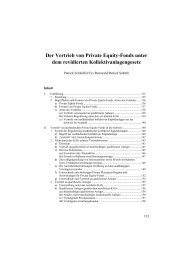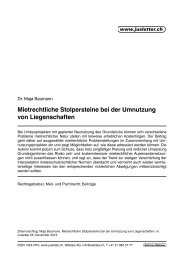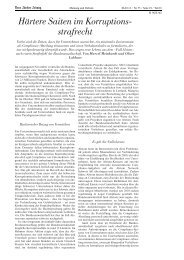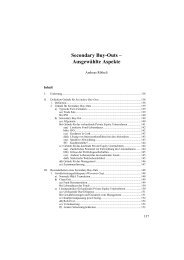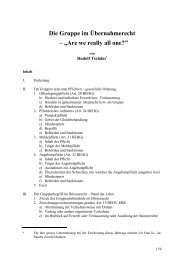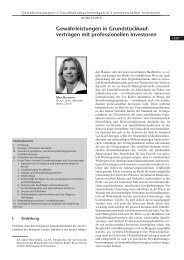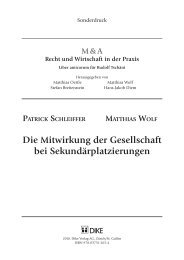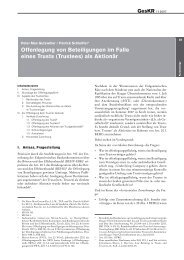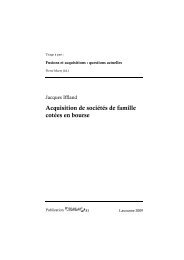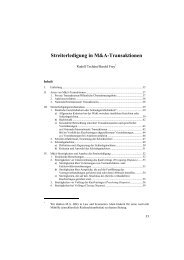Cross-border financial serv - Lenz & Staehelin
Cross-border financial serv - Lenz & Staehelin
Cross-border financial serv - Lenz & Staehelin
You also want an ePaper? Increase the reach of your titles
YUMPU automatically turns print PDFs into web optimized ePapers that Google loves.
Shelby R. du Pasquier / Philipp Fischer – <strong>Cross</strong>-<strong>border</strong> <strong>financial</strong> <strong>serv</strong>ices in and from Switzerland GesKR 4 2010<br />
viduals. The only exception is the business with institutional<br />
investors can be freely conducted on a cross<strong>border</strong><br />
basis, subject only, as a rule, to a notification to<br />
the BaFin. In a joint declaration dated October 27, 2010,<br />
Switzerland and Germany undertook to initiate negotiations<br />
in order to improve the access of banking institutions<br />
of each State to customers located in the other<br />
State 150 .<br />
bb. France<br />
French law provides for strict rules with respect to<br />
the so-called «direct marketing» of <strong>financial</strong> <strong>serv</strong>ices<br />
and products to French-based customers (see Articles<br />
L.341-1 et seq. of the French Code).<br />
From a French perspective, the concept of «direct marketing»<br />
encompasses any unsolicited contacts, by any<br />
means, with identified individuals or legal entities, or<br />
any physical meetings irrespective of the person initiating<br />
the meeting, at the prospective customer’s home,<br />
workplace or any other place which is not designed<br />
for the marketing of <strong>financial</strong> products, provided such<br />
contacts are initiated and conducted with a view to obtaining<br />
the customer’s consent to the entering into of a<br />
transaction related to <strong>financial</strong> instruments, the entering<br />
into of a banking (or a non-core banking) transaction<br />
or the provision of an investment (or a non-core investment)<br />
<strong>serv</strong>ices (Article L.341-1 French Code).<br />
«Direct marketing» activities as defined in the preceding<br />
paragraph may only be carried out in France by regulated<br />
entities, meaning (A) French entities licensed as<br />
credit institutions, investment firms or insurance companies,<br />
(B) EU-licensed entities which can rely on the<br />
EU passport or (C) any of their agents duly appointed<br />
to carry out solicitations on behalf and for account of<br />
the entities mentioned above (Articles L. 341-3 and L.<br />
341-4 French Code). An exemption also applies, subject<br />
to certain requirements, to contacts with pre-existing<br />
customers (Article L. 341-2 (5) French Code) and with<br />
qualified investors (meaning regulated <strong>financial</strong> institutions<br />
and individuals meeting certain requirements,<br />
including a <strong>financial</strong> assets base in excess of EUR<br />
500’000 151 ) (Article L. 341-2 (1) French Code). Noncompliance<br />
with the rules and regulations applicable to<br />
the direct marketing in the <strong>financial</strong> and banking sector<br />
may give rise to criminal, disciplinary or civil sanctions<br />
(Articles L. 353-2 to L. 353-4 French Code).<br />
As a practical matter, the provision of banking and <strong>financial</strong><br />
<strong>serv</strong>ices to French customers is almost impossible<br />
without establishing a physical (and regulated)<br />
150 The (German) text of this joint declaration is available online at:<br />
http://www.news.admin.ch/NSBSubscriber/message/attachments/20991.pdf.<br />
151 See Section D411-1 of the French Code.<br />
presence in this country, either in the form of a branch<br />
or a subsidiary.<br />
The above situation has led to the creation of a special<br />
regulatory status, the conseiller en investissements financiers<br />
(or «CIF», in English: «<strong>financial</strong> advisor»)<br />
(Articles L541-1 et seq. French Code and Articles 325-<br />
1 et seq. AMF Regulations), which allows non-French<br />
individuals or entities to target French-based customers<br />
on a cross-<strong>border</strong> basis. In order to benefit from this<br />
status, the concerned individual or entity must, among<br />
other things, adhere to one of several recognized French<br />
self-regulatory organizations (which are themselves supervised<br />
by the AMF), comply with a series of rules of<br />
conduct vis-à-vis its clients and subscribe a professional<br />
liability insurance. In turn, this status does not trigger<br />
the stringent and burdensome residence and capital adequacy<br />
requirements (and associated costs) that apply to<br />
a French-licensed asset management firm. From a practical<br />
perspective, the main drawback of the CIF status is<br />
that it only allows the provision of investment advisory<br />
(as opposed to management) <strong>serv</strong>ices.<br />
bc. Italy<br />
The offering of banking and <strong>financial</strong> <strong>serv</strong>ices in Italy<br />
is regulated primarily under the Legislative Decree n°<br />
385 of September 1, 1993 (also called the Consolidated<br />
Banking Act).<br />
Italy replicated in its internal legislation the EU passport<br />
system: as a result, <strong>financial</strong> institutions established<br />
and licensed in an EU Member State may offer<br />
banking and <strong>financial</strong> <strong>serv</strong>ices on Italian soil, subject<br />
only to a duty of notification by the home country supervisor<br />
to the Italian supervisor, the Bank of Italy 152 .<br />
One particularity of the Italian regulatory regime is<br />
however that it provides for a specific license for banking<br />
and securities dealing activities conducted strictly<br />
on a cross-<strong>border</strong> basis, i.e., without a physical presence<br />
in Italy 153 . Banking institutions established in a<br />
non-EU Member State can also operate on the Italian<br />
market without establishing a branch or a subsidiary<br />
in Italy (libera prestazione di <strong>serv</strong>izi) 154 , provided they<br />
have been authorized by the Bank of Italy. The CON-<br />
SOB is entitled to extend such cross-<strong>border</strong> license to<br />
securities trading activities. Swiss banking institutions<br />
that rely on such a cross-<strong>border</strong> license can only offer<br />
their <strong>serv</strong>ices through promotori finanziari (namely individuals<br />
which have been specifically registered with<br />
the Italian supervisory authorities). This restriction<br />
does however not apply if the <strong>serv</strong>ices are offered exclu-<br />
152 Article 16.3 of the Italian Consolidated Banking Act. An English<br />
version of this statutory text is available online at: http://www.<br />
bancaditalia.it/vigilanza/banche/normativa/leggi/tub/tub_en.pdf.<br />
153 Bizzozero/Christopher Robinson (FN 10), 215.<br />
154 Article 16.4 of the Italian Consolidated Banking Act (FN 152).<br />
455<br />
Aufsätze



